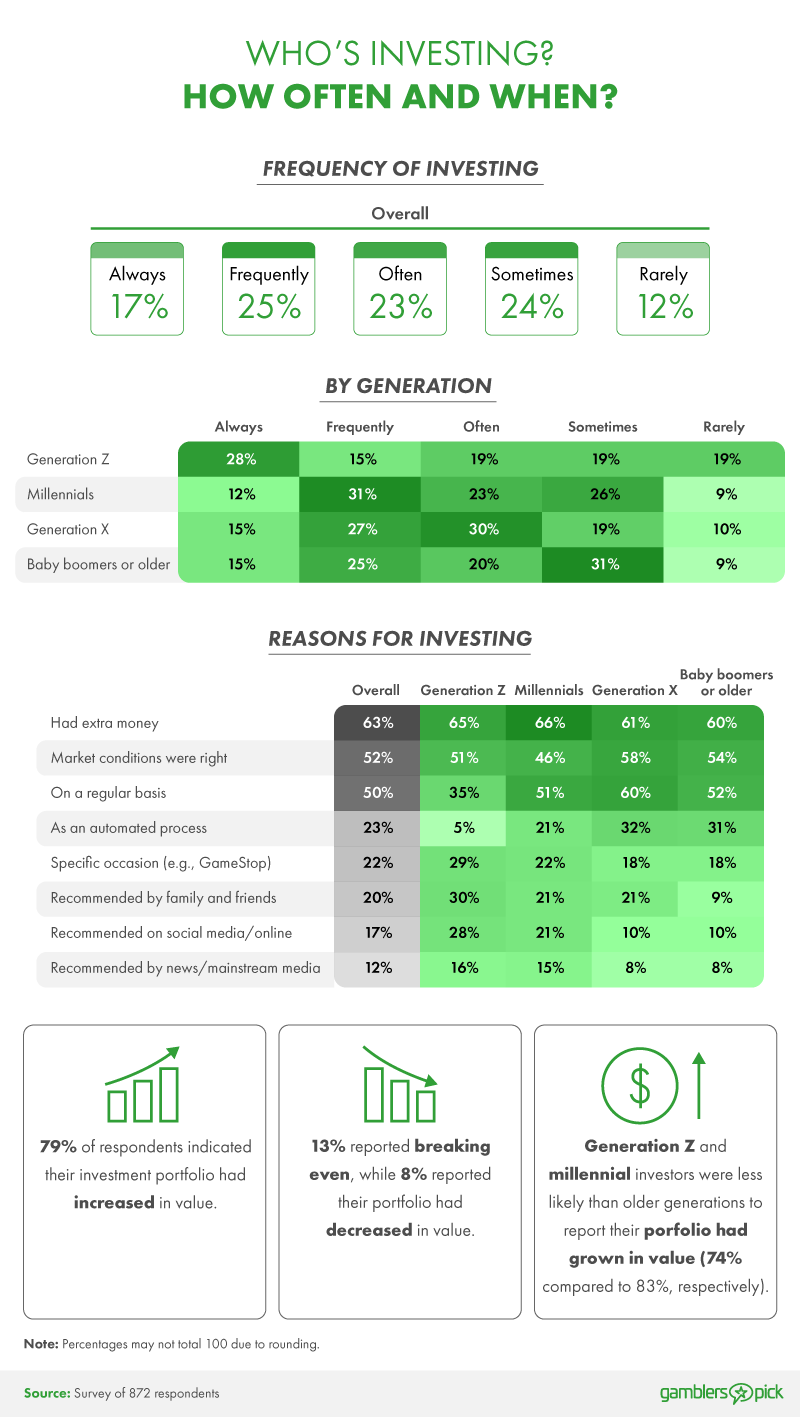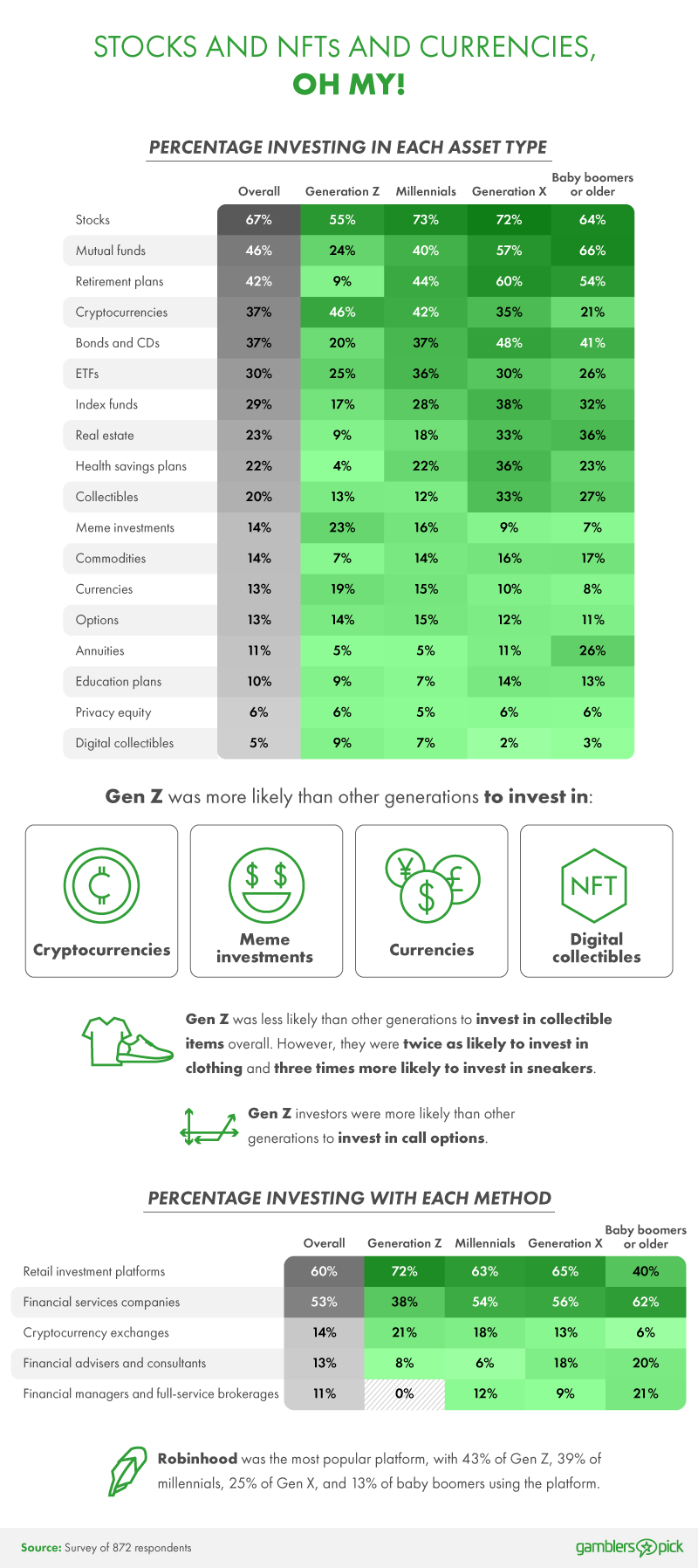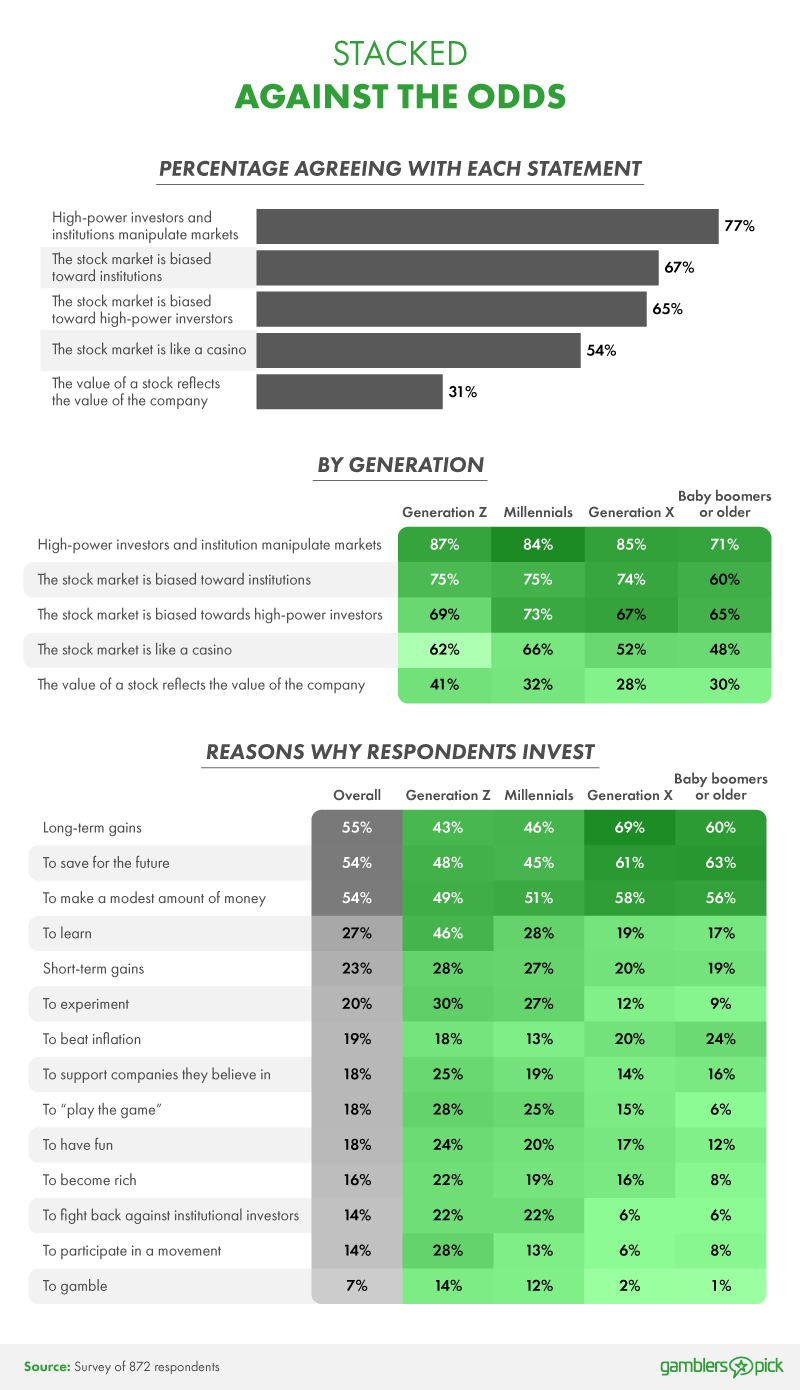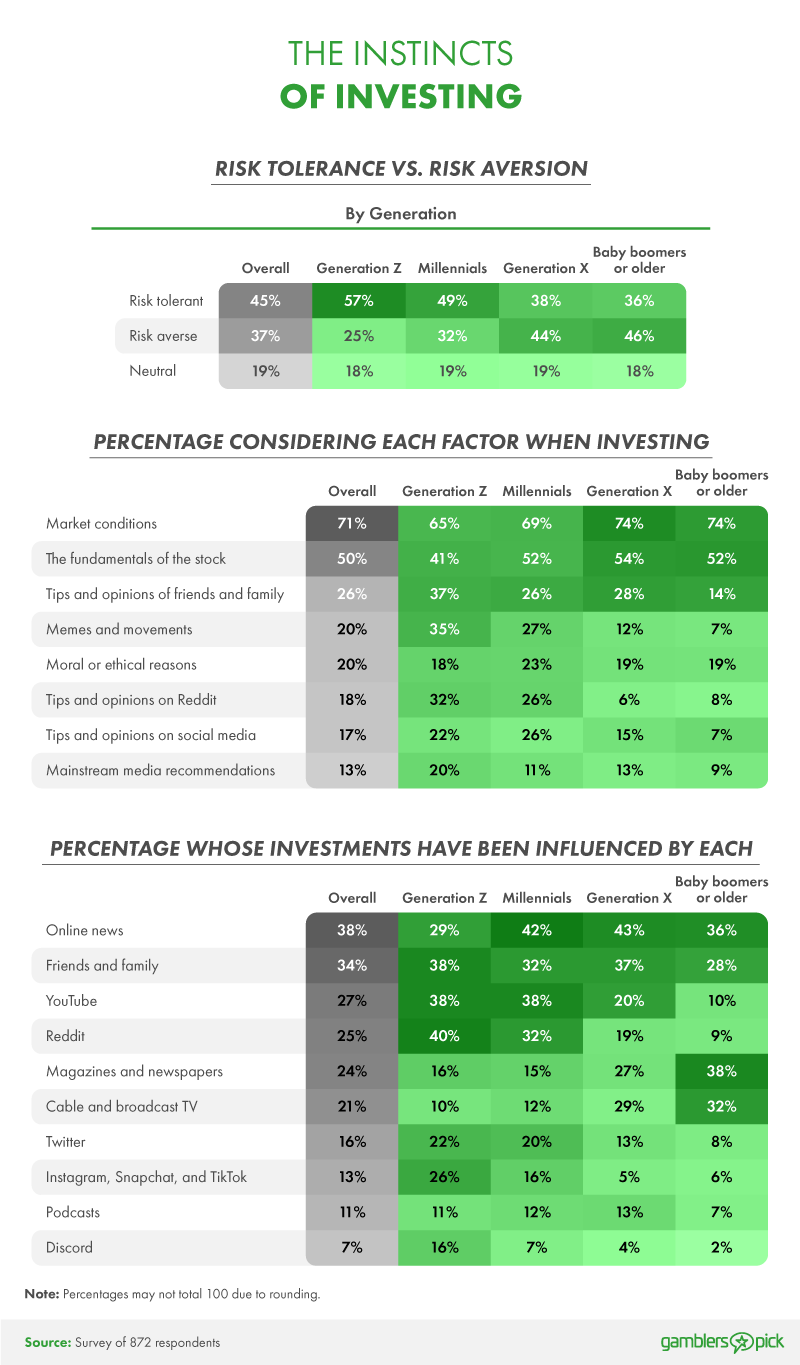-
Casinos for you
Cryptos and NFTs: Gen Z Investors Have Entered the Chat [Survey]
By GamblersPick Apr 25, 2021![Cryptos and NFTs: Gen Z Investors Have Entered the Chat [Survey]](/uploads/monthly_2021_04/header.png.c80813d686561be170e989464aaeec4e.png) The generations share their opinions on trending investment strategies
The generations share their opinions on trending investment strategiesKey Takeaways:
- Gen Z’s investment habits are more likely to be influenced by Reddit, Twitter, and other social media, while older generations are more likely to have their investments influenced by magazines, newspapers, and TV.
- Gen Z is less likely to invest in a majority of typical/traditional/common assets but more likely to invest in cryptocurrencies, meme investments, currencies, and NFTs.
- Gen Z is less likely to invest in collectibles but more likely to invest in clothing and sneakers.
- Reasons Gen Z and many millennials are investing include the desire to “participate in a movement” and “fight back against institutions.”
Investing for All Ages
The ‘crypto craze’ has taken the world by storm – a week into 2021, the market value of cryptocurrencies surpassed a whopping $1 trillion. To put its surge into perspective, the value of all digital currencies added up to only around $260 billion last June, and it is now the fifth-most circulated currency worldwide, even surpassing huge economies like India and the UK.
With the investment world booming, we wanted to take a closer look at investment strategies among the generations, with a particular focus on Gen Z. Let’s see how often they invest and when they feel is the right time to do so. Also, what kind of assets are they interested in, and what mediums do they use to (attempt to) grow their money? Lastly, we’ll assess respondents’ investment motivations as well as their sensitivity to risk. Read on to see who and what is pulling in the big bucks.
Trigger-Happy

Overall, a quarter of respondents admitted to investing frequently. It was a relatively popular activity among them, as only 12% said they rarely did it. On a generational level, Gen Zers couldn’t get enough of the practice – 28% said they were constantly investing. That being said, they were also the most likely to say they rarely do. As people got older, they were generally less active in the investment world; millennials were most likely to frequently invest, Gen Xers would do it often, and baby boomers and older generations would only sometimes try their hand at it.
Respondents were most eager to invest when they felt like they had extra money to spend. Over half of them pulled the trigger when market conditions were right and would invest on a regular basis. Jumping into the stock market and other investment mediums can be exhilarating, so people should keep a few tips in mind to maximize success: Focus on the future by keeping a long-term perspective, don’t sweat the small stuff, and be open-minded.
Weighing the Options
With many different asset options to invest in and methods to do so, what do people tend to use the most?

By a margin of just over 20 percentage points, the most popular asset to invest in was stocks – almost three-quarters of millennials and Gen Xers preferred to put their money in them over the other options. Putting your money into the stock market can be very financially beneficial – the simplest reason to invest is to grow your wealth, and people tend to amass anywhere between 7% and 10% of their original investment in returns per year. Historically, stocks generally rise and earn more money for investors than other options – therefore, investing in stocks is a relatively safe strategy, making it an attractive choice for many.
The most common medium used to invest were retail investment platforms – Gen Zers especially preferred them, but baby boomers (or older) tended to use financial service companies to help them invest their money. There are a ton of investment apps at our disposal, and they are known to excel in different areas – for example, ‘Invstr’ was deemed the best for learning all about investing; ‘Wealthfront’ is known for its sophisticated portfolio management; and ‘Betterment’ is great for people who are interested in socially responsible investing strategies.
Assessing Motivations
Some are skeptical about the legitimacy of the investment world. Either way, they continue to attempt to grow their money.

A conspiracy is afoot, as 77% of respondents believed the markets are manipulated by high-power investors and institutions, and many also agree that the stock market is biased toward them. Generally, baby boomers (and older) were a little more skeptical of these theories, but the younger generations were pretty sure there’s some truth behind them.
A lot of research has been done to figure out what’s going on, and technically speaking, it would be difficult to prove that the stock market is rigged for the average investor due to laws and governing bodies, such as the U.S. Securities and Exchange Commission (SEC), to keep things in check. That being said, there are clear advantages that higher-ups, such as the money managers on Wall Street, have access to – among them are access to private and sensitive information, a ton of capital, political influence, and generally high experience when it comes to trading.
Regarding investment motivations, Gen Zers, and in many cases millennials, did not have the same incentives as older generations. While Gen Xers and older respondents were interested in long-term gains, saving for the future, and making solid returns, their younger counterparts were particularly drawn to doing it for social causes, like fighting back against institutions and participating in movements.
Risk and Influences
Are people high-rollers, or do they prefer the small victories? Also, what are they influenced by when it comes to investment decisions?

From the data collected, we can see that Gen Zers had a much higher risk tolerance than older generations, and baby boomers (and older respondents) tended to prefer to be a little safer with their investments. The most important aspect considered, by far, when investing was the market condition at the time. Instead of the stock fundamentals, Gen Zers were more interested in the tips and opinions from their family and friends, as well as the advice they found on Reddit. Millennials were the most likely to look for advice on social media and were also most likely to attribute moral or ethical reasoning to their investment decisions.
Perhaps unsurprisingly, Gen Zers were more influenced by the online landscape, including YouTube, Reddit, and other social media applications, whereas the older generations tended to make their decisions based on what they were seeing in magazines, newspapers, and on television. The reality is, older people just aren't online nearly as much as young people. For example, 2021 Facebook demographic data shows that out of the 2.7 billion active monthly users, 86% of them are aged 18 to 29, whereas only 34% are 65 or older. The difference is even greater for Instagram’s 1 billion active monthly users – the split is 67% to 8%, respectively.
The Learning Curve
Clearly, the idea of investing has piqued the interest of many Gen Zers. Their preferred assets, method choices, motivations, and considered factors when investing are different than older generations. This is to be expected, especially with how much they use the internet and their dedication to social causes. A common stereotype is that young people are reckless, especially with their financials, but it was Gen Zers who were the most likely to invest to gain more insight about the investment landscape.
Aside from the stock market, another way to grow your money is by rolling the dice at the casino. One thing that these two potential money-growing platforms have in common is that if you’re well informed on what you’re doing, you’re more likely to succeed. Gambler’s Pick is your go-to resource for learning about the ins and outs of online gambling – take a look at their casino reviews, helpful guides, and suggestions before diving into the many casino games you can try your hand at on their website. Head over there now to become a gambling guru!
Methodology and Limitations
We surveyed 872 people about their investment strategies to explore how different generations are investing. Twenty-four percent of respondents were Gen Zers, 27% were millennials, 25% were Gen Xers, and 24% were baby boomers or older. An attention-check question was used to help ensure respondents read questions and answers in their entirety.
The data we’re presenting rely on self-report. There are many issues with self-reported data which include, but are not limited to, the following: attribution, exaggeration, telescoping, and selective memory.
Fair Use Statement
If you know someone who’s interested in dipping their toes into the world of investing or just wants to learn more about investment strategies, feel free to send this article their way. We just ask that you do so for noncommercial use only and to provide a link back to the original page so contributors can earn credit for their work.
Tags
Related Blog Posts
-
CASINOS
- Popular
- Specialty
- Features
- Casinos By
-
BONUSES
- Popular
- By Type
-
GAMES
-
Slots
- Popular
- By Software
- Variations
- Features
-
Blackjack
- Popular
- Variations
- Features
-
Roulette
- Popular
- Variations
- Features
-
Video Poker
- Popular
- Variations
- Features
-
Craps
- Popular
- Features
-
Baccarat
- Popular
- Features
-
Poker
- Popular
- Variation
- Features
-
More Games
- Keno
- Bingo
- Fixed Odds
- Other Games
-
JACKPOTS
- Popular
- By Game
- By Software
-
COMMUNITY



.png.0f651d9e8ab97819d8e6bcc89d162b26.png)

.png.a0acfd195007976e042ec7e6bcc699bc.png)










.jpg.80608d000033788c9aa397d7b5489349.jpg)
.jpg.6b9828f10acec861aa6d7ecd9550803e.jpg)





.jpg.0f083fed53833a901d7e4f85850a3502.jpg)








.jpg.6b9828f10acec861aa6d7ecd9550803e.jpg)
![Gauging Investors’ Stock Market Knowledge [Survey]](/uploads/monthly_2021_09/stock-market-smarts-header.jpg.ed9e6b59e99212d460da620a6bcb5d24.jpg)






Recommended Comments
There are no comments to display.